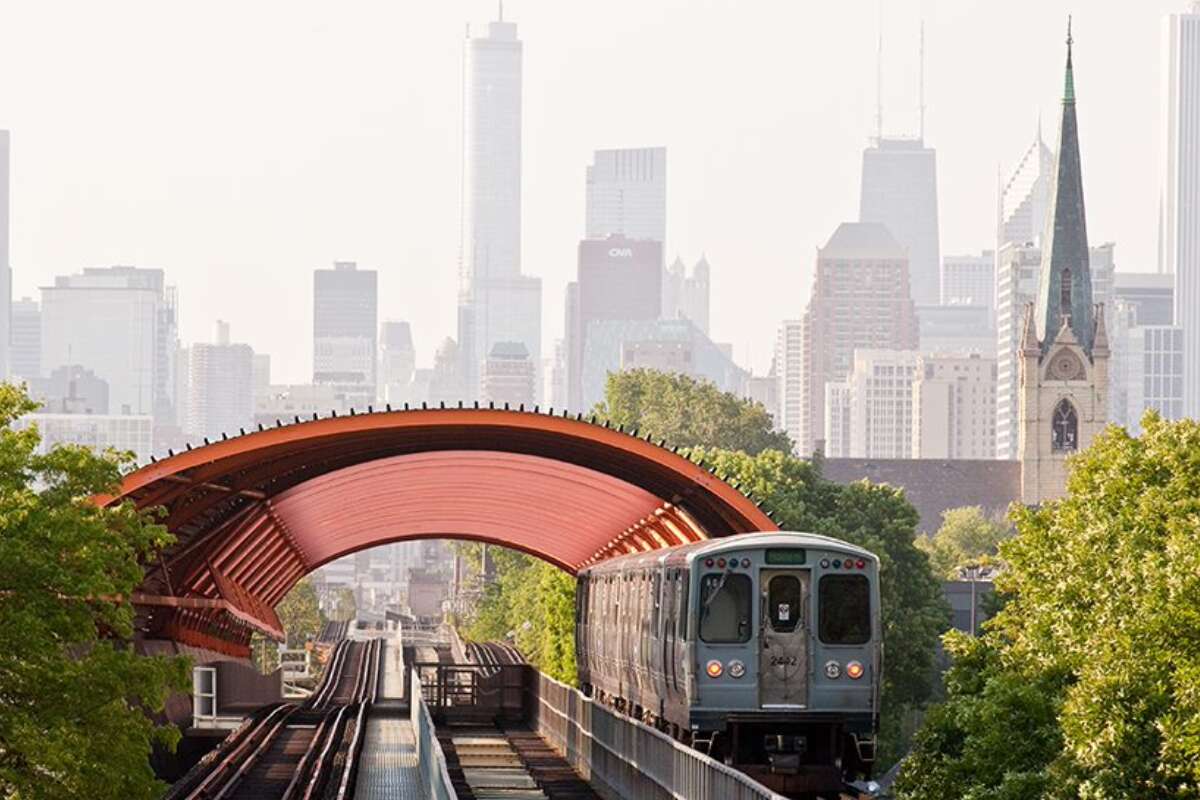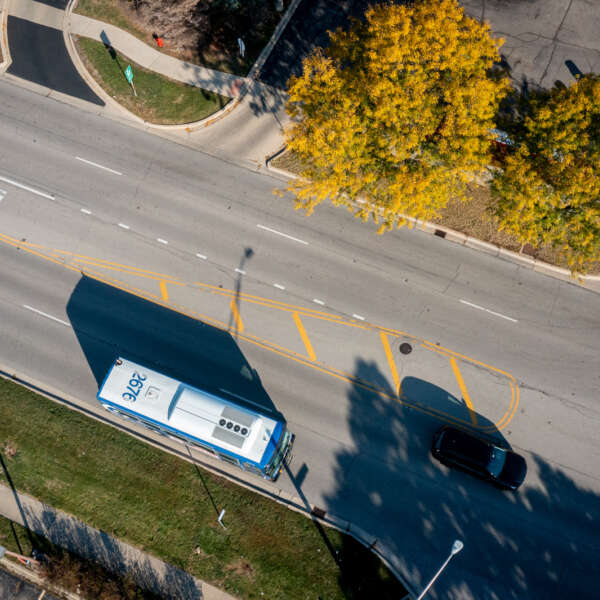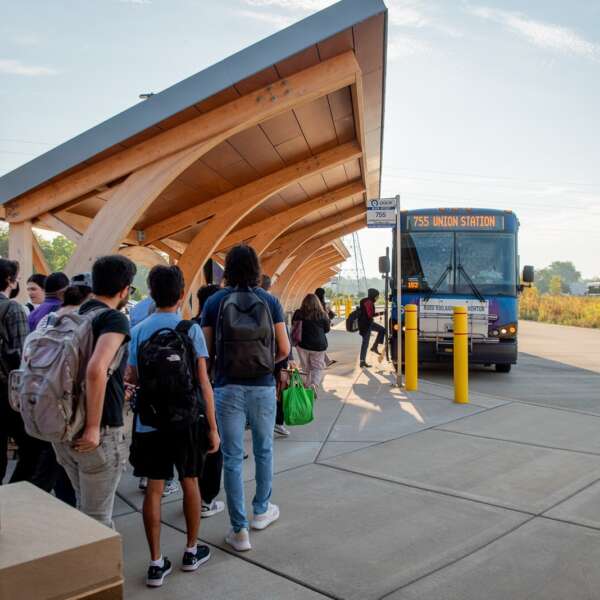RTA begins new engagement tactic in Garfield Green Line South Action Plan: paying residents for their time
March 24, 2022
March 24, 2022

Washington Park, home of the Garfield Green Line station, has had no shortage of plans written for it in the past decade. But high rates of vacant land persist, along with a general sentiment among residents that the plans weren’t made with their needs in mind or with their perspectives considered.
So the RTA, together with Elevated Chicago and the Chicago Metropolitan Agency for Planning (CMAP), are creating the Garfield Green Line South Action Plan to facilitate equitable growth around the station, and are relying on a Resident Action Council (RAC) to do so.
The RAC, which consists of about a dozen residents, local business leaders, and other stakeholders, has been meeting regularly since August 2021 and marks the first time the RTA has compensated residents for their time and expertise in a planning initiative. This method of engagement encourages participation by people who would not normally engage in a community planning project due to a lack of transportation options, childcare needs, opportunity cost, etc., and shows that their time and perspectives are valued.
The Garfield Green Line South Action Plan is part of a larger project focused on equitable transit-oriented development that was accepted as part of the RTA and CMAP joint Call for Projects in 2019. Elevated Chicago, a collaboration of 17 public, private and nonprofit organizations came together to apply for support in implementation and strategy for the area around the Garfield CTA station focusing on access, community safety, equity, placemaking, and beautification. Learn more about the project here.
During a team working meeting early in the process, Elevated Chicago staff suggested residents be compensated for their engagement, and the RTA volunteered to provide those funds. Paying residents for engagement is becoming a standard practice, with more and more examples across the country popping up over the past couple years. For the Garfield Green Line South Action Plan, this engagement played a major role in shaping the process.
“We did shift to not doing a new planning process because of this engagement,” said Lindsay Bayley, Senior Planner at CMAP who facilitates the RAC meetings. “Just being able to have these intimate conversations with people and then hearing over and over, ‘We don't need another plan. Seriously, we don't need another plan,’ really changed our approach from the way we would normally do it. We didn't want to walk people through that process because it's almost retraumatizing. They feel like, ‘We've done this before, and nothing has happened, so don't come to us doing the same thing over and over again.’”
The action plan consolidates action items from past plans for the neighborhood, as they have been prioritized by the RAC. For each action item, the plan will include information on costs and potential funding, possible roadblocks, measurements of complexity, who would be in charge, who potential partners could be, and immediate next steps. The goal is to leave residents with a document that tells them whom to hold accountable for the things they want done in their neighborhood.
Community engagement is key for an action plan like this, but for residents in disinvested neighborhoods, participating in meetings requires a heavier lift. Considerations regarding childcare, transportation, and opportunity cost often keep residents from getting involved. To combat this, the RTA invested $10,000 with a match from Elevated Chicago to pay members of the RAC for their time and to provide meals during meetings. After each two-hour meeting, each participant receives a $50 Visa gift card.
One of the members of the RAC is Cecilia Butler, a longtime community advocate and organizer. Butler was instrumental in forming the Washington Park Advisory Council through the Chicago Park District and has been president of the council since 1993.
“For over 30 years I came to meetings like this without getting paid,” Butler said. “But it helps. A little money can pay your light bill, which makes a difference for those who need it.”
[caption id="attachment_6688" align="alignright" width="2268"] Members of the Resident Advisory Council meet to discuss the Garfield Green Line Action Plan. Photo courtesy of CMAP.[/caption]
Members of the Resident Advisory Council meet to discuss the Garfield Green Line Action Plan. Photo courtesy of CMAP.[/caption]
Bayley and Michael Horsting, Manager of Local Planning at the RTA, said paying people helps, but doesn’t represent a full solution to a complex problem. Some members of the RAC still don’t trust planners, especially when they are white and from outside the neighborhood. Disinvestment and poor engagement in the past means planners have to work hard now to build trust and do right by residents.
“The biggest complaint as a resident in Washington Park that I have is that all of the organizations that have ever done anything for Washington Park haven’t really lived in Washington Park,” Butler said. “We as residents resent that, and we’re supposed to. Washington Park needs help, but we can think. The most important thing that the residents want is to be included and respected.”
In addition to building trust, the process of paying members of the RAC presented logistical challenges that the RTA plans to continue working out in future applications. One lesson learned is that flexibility needs to be built in to ensure as many diverse voices are invited as possible throughout the process, even if they weren’t involved right from the beginning.
“The meetings have been the best they could be,” Butler said. “I’ve been in so-called planning meetings where the room was packed, and you didn’t get anything done because there were people who came with an ulterior motive. I think we needed a few more people in the room, but we needed people who really wanted to be in the room.”
The RTA plans to pay participants for a similar Logan Square action plan, as well as some people who engage with the regional transit strategic plan currently in development. Through these projects, the RTA will develop a clear set of processes and requirements for compensation for engagement in planning activities. The agency will continue to be transparent about these efforts and accept feedback.
“The RTA is committed to improving its engagement efforts to include those most impacted by transit planning decisions, including thinking outside the box about how to get diverse voices in the room and ensure they are compensated for their time and effort,” said Michael Horsting, Manager of Local Planning at the RTA.
In terms of the Garfield Green Line South Action Plan, what Butler hopes to get out of it in the end is a roadmap to equitable change that prioritizes residents’ needs.
“I hope we bring the elected officials, the government agencies, the stakeholders, the people with the money, the developers together to help us improve our community like they have done in Woodlawn and Grand Boulevard,” Butler said. “There's a visual difference—improvement—in Woodlawn and Grand Boulevard. And when you stretch both of those communities out, guess what? They lead to Washington Park. The help that they got, we need.”
Subscribe to our Newsletter
Related Articles
 Coalition members provide feedback on ‘Transforming Transit,’ RTA’s vision for improved service and accountability
Coalition members provide feedback on ‘Transforming Transit,’ RTA’s vision for improved service and accountability
Nearly 200 riders, advocates, and other stakeholders met virtually with the RTA on February 11 for the sixth quarterly Transit is the Answer Coalition meetin...
February 20, 2025 Far South Halsted Corridor Study prepares for future Pace Pulse service
Far South Halsted Corridor Study prepares for future Pace Pulse service
An RTA Community Planning project kicked off in late 2023 as a crucial step in bringing Pace Pulse service to Chicago’s south suburbs. The Far South Halsted ...
February 19, 2025 RTA proposes reforms to prioritize capital projects, maximizing impact of funding
RTA proposes reforms to prioritize capital projects, maximizing impact of funding
RTA is proposing a historic restructuring of the region’s transit governance to maximize the impact of new operating funding and ensure all riders experience...
February 5, 2025 RTA proposes reforms to integrate fares, require accountability for faster and more reliable transit
RTA proposes reforms to integrate fares, require accountability for faster and more reliable transit
RTA is proposing a historic restructuring of the region’s transit governance to maximize the impact of any new operating funding and ensure all riders experi...
February 5, 2025 For the third year in a row, regional transit ridership was up by double-digits in 2024
For the third year in a row, regional transit ridership was up by double-digits in 2024
Ridership across the Chicago region’s transit system continued to increase throughout 2024, according to the latest data from CTA, Metra, and Pace. The regio...
January 28, 2025 RTA is seeking $1.5 billion in annual operating funding. What would that mean for your commute?
RTA is seeking $1.5 billion in annual operating funding. What would that mean for your commute?
On January 15, RTA released Transforming Transit, a vision for the regional transit system with $1.5 billion in annual operating funding supported by a stron...
January 28, 2025